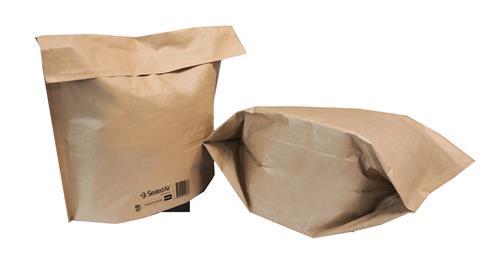
Next in our Finalist Interview series for the Sustainability Awards is SEE (formerly Sealed Air) with its TempGuard insulated bag for chilled food products. We spoke to the company about this entry, nominated in the commercialised Recyclable Packaging category.
You’re a finalist in the Sustainability Awards 2023. Congratulations! To start off, could you summarise your entry, in less than 50 words?
Our entry is the Sealed Air® TempGuard gusset bag, a 100% paper based insulating pouch that keeps perishable food products fresh and chilled during transit, offering full curbside recyclability and a more efficient pack-out process. It is an alternative to non-recyclable plastic that often ends up in landfills.
Why do you think the judges were impressed with your entry? Tell us about what is innovative about your project and/or about its impact on packaging sustainability.
SEE’s TempGuard gusset bag can meet critical requirements of sustainable packaging that are addressing the ever-evolving needs of consumers and companies today. The COVID-19 pandemic has changed the way we buy and consume food and many of these trends are here to stay, including spikes in online food and groceries purchases, rising popularity and availability of more economical home-cooked meals and more mindful eating focusing on health and wellness.
For meal kit delivery services alone, it has grown significantly and is expected to grow at a compounded annual growth rate (CAGR) of 17.4% from 2022 to 2030. There is also increasing consumer demand for more sustainable packaging. Not just in the recyclability and reusability of the packaging, but also how it protects and keeps food safe and intact and reduces food waste.
In addressing these needs, companies are also looking for sustainable solutions that can enhance operational efficiency, such as reducing void space to fit more products into a bag, maximising warehouse space and preventing leakage and spillage.
SEE’s TempGuard gusset insulated bag is made of all-paper mono material, with several layers of kraft paper and expanded honeycomb paper as the insulation core and is 100% curbside recyclable. It is made from responsibly sourced fibres and FSC certified paper. The fibre-based materials meet the FSC chain of custody requirements from sourcing to distribution. The bag contains at least 25% recycled fibre and the paper materials used are REACH SVHC and RoHS compliance. The bag has been fully tested at an ISTA 20 thermal certified lab.
A recycling logo is printed on the bag with clear on-pack communication on how to dispose after use. Consumers can dispose of the packaging in their curbside collection recycling bins.
The bag is designed with a bottom gusset which can fit more products compared to some plastic-based packaging. This means a higher product-to-package ratio and shorter pack-out time. It can stand upright with better stability, reducing void space within the meal kit carton, maximising space efficiency in the warehouse and providing a more efficient pack-out process.
Because there is no seam at the bottom gusset, it can prevent leakage or spillage from the food products or condensation from gel packs during transit. Lastly, the bag has a special self-seal adhesive flap to maintain temperatures as low as 0 degree Celsius, ensuring essential insulation for meal kits.
How has your innovation/initiative been received?
The Tempguard Gusset bag has been well received in the Australian market where the solution is used by HelloFresh to keep their products fresh and chilled. It received the 2023 Sustainability Packaging Design of the Year Award (Silver) in the recent PIDA Australiasian Packaging Innovation and Design Awards.
You’re shortlisted for the Recyclable Packaging category. What do you see as the key demands and challenges in relation to design for circularity in packaging?
One of the biggest demands driving food packaging design today is designing for recyclability while also designing to prevent food waste through proper product protection and extension of shelf life. For temperature-controlled packaging solutions, these are not the only key requirements, especially in today’s complex supply chain and fast-paced fulfillment and ecommerce sectors. Functional, sustainable packaging should also be able to withstand the rigors of the supply chain while helping companies to reduce their carbon footprint.
At SEE we start with designing for sustainability while taking a holistic approach looking across the entire supply chain. We analyse data and look at using alternative materials that will provide the same kind of protection and performance but reduce the carbon footprint for our customers.
We look at how we can prevent waste by designing products with the least amount of materials and resources necessary while still protecting, improving shelf life and minimising food waste.
What do you think are the main opportunities in this area or what future innovations do you predict in this area?
Sustainability is at the core of everything SEE does and it’s one of our key strategic pillars with the other two being automation and digital. We see tremendous opportunities to extend sustainable value and enable sustainable outcomes through automated and digital packaging.
Automated packaging lines can enhance food safety and higher levels of hygiene through less manual handling and fewer touchpoints, while optimising processes and improving sustainability through greater packaging consistency and accuracy to minimise material and energy usage and waste.
A digital or smart package can be a vital source of information on tracing food through the supply chain. It can enable greater transparency for the food being consumed and help consumers make healthy and sustainable choices. For brand owners, a digital package can be a data point for brands to make smarter decisions on sales, marketing, fulfillment, and logistics, and help tackle issues like food waste and food fraud.
The winners of the Sustainability Awards 2023 will be announced at the Sustainable Packaging Summit, which takes place in Amsterdam on 14-15 November. The Summit mobilises leaders of the FMCG value chain, policymakers, NGOs, recyclers and investors to collaborate, remove barriers and identify opportunities on the road to sustainable transformation.
To learn more or register, visit https://www.packagingsummit.earth/amsterdam2023/.
















No comments yet